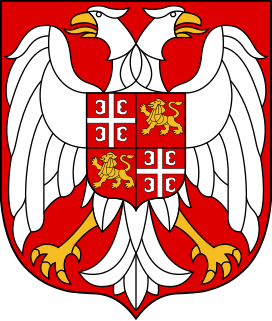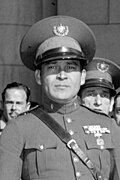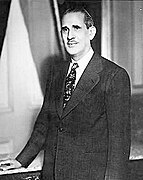
The Socialist Party is a social-democratic political party in Portugal. It was founded on 19 April 1973 in the German city of Bad Münstereifel, by militants from the Portuguese Socialist Action. The PS is one of the two major parties in Portuguese politics, its rival being the centre-right Social Democratic Party (PSD). The current leader of the PS is António Costa, the Prime Minister of Portugal. The party has currently 86 of 230 seats in the Portuguese Parliament following the October 2015 election, forming a minority government.

The Party for Democracy is a centre-left political party in Chile. It states to stand in the traditions of democratic socialism and liberal progressivism. It was founded in December 1987 by Ricardo Lagos, who aimed at forming a legal social-democratic party, as the Socialist Party of Chile (PS) remained illegal at the time. The PPD continued to function after the defeat of Pinochet. Until 1997, double membership of PPD and the PS was allowed.

The Socialist Party of Chile is a political party within the centre-left Nueva Mayoría. Its historic leader was President of Chile Salvador Allende, who was deposed in a coup d'état by General Pinochet in 1973. Twenty-seven years later, Ricardo Lagos Escobar represented the Socialist Party in the 1999 presidential elections. He won 48.0% in the first round of voting and was elected with 51.3% in the second round. In the legislative elections on 16 December 2001, as part of the Coalition of Parties for Democracy, the party won 10 out of 117 seats in the Chamber of Deputies and 5 out of 38 elected seats in the Senate. After the 2005 elections, the Party increased its seats to 15 and 8, respectively. In the 2009 elections, it retained 11 Congressional and 5 Senate seats.

Parliamentary elections were held in Serbia on 21 January 2007 to elect members of the National Assembly. The first session of the new National Assembly of the Republic of Serbia was held on 14 February 2007. The elections enabled the coalition of DS; DSS & G17+ to continue.

The Revolutionary Febrerista Party is a democratic socialist party of Paraguay.

The Popular Socialist Party was a communist party in Cuba. Originally called the Communist Party of Cuba, it was formed in 1925 by a group including Blas Roca, Anibal Escalante, Fabio Grobart, Alfonso Bernal del Riesgo and Julio Antonio Mella, who acted as its leader until his assassination in Mexico in 1929. It was later renamed the "Communist Revolutionary Union". After the electoral victory of the Partido Auténtico in the 1944 elections, the party went into decline, and eventually adopted the name "Popular Socialist Party" for electoral reasons.
Parliamentary elections were held in Bulgaria on 18 December 1994. The Democratic Left, the core of which was the Bulgarian Socialist Party, won 125 of the 240 seats, enough to govern without the support of parties from outside the coalition. Voter turnout was 75.3%. Following the election, Socialist Party leader Zhan Videnov became Prime Minister.
The Liberal Party was one of two major political parties in Bolivia in the late 19th century and the first half of the 20th century. The other was the Conservative Party. The Liberal Party was formally founded in 1883 by Eliodoro Camacho. The party espoused freedom of religion, a strict separation between church and state, legal acceptance of civil marriages and divorce, and strict adherence to democratic procedures. When the party took power in 1899, it moved the base of the presidency and the Congress to La Paz, which became the de facto capital city. The Supreme Court remained in Sucre. To this day, Sucre is the de jure capital of Bolivia while La Paz acts as the de facto seat of government.
The Republican Socialist Unity Party was a political party founded on 10 November, 1946 in Bolivia as the fusion of the Republican Socialist Party, the Genuine Republican Party, the United Socialist Party, and the Independent Socialist Party.

Parliamentary elections were held in the Federal Republic of Yugoslavia on 3 November 1996. A coalition of the Socialist Party of Serbia, the Yugoslav Left and New Democracy emerged as the largest bloc in the Federal Parliament, winning 64 of the 138 seats. Radoje Kontić, member of the Montenegrin ruling party, the Democratic Party of Socialists of Montenegro, was confirmed as Prime Minister of the Federal Republic of Yugoslavia. He was replaced, in 1998, by Momir Bulatović, leader of Socialist People's Party of Montenegro.

General elections were held in Cuba on 1 June 1948. Carlos Prío Socarrás won the presidential election running under the Auténtico-Republican Alliance banner, whilst the Partido Auténtico emerged as the largest party in the House of Representatives, winning 29 of the 70 seats. Voter turnout was 78.7%.

General elections were held in Cuba on 1 June 1944. Ramón Grau San Martín won the presidential election running under the Auténtico-Republican Alliance banner, whilst the Partido Auténtico emerged as the largest party in the House of Representatives, winning 19 of the 70 seats.

Parliamentary elections were held in Cuba on 1 June 1950. The Partido Auténtico-Democratic Party-Liberal Party alliance won 42 of the 66 seats. It was the last free election held in Cuba on a national level.

General elections were held in Bosnia and Herzegovina on 12 and 13 September 1998. The elections for the House of Representatives elections were divided into two; one for the Federation of Bosnia and Herzegovina and one for Republika Srpska. In the presidential election, each of the three national communities elected a President. Bosniaks re-elected Alija Izetbegović, Croats elected Ante Jelavić and Serbs elected Živko Radišić. The Coalition for Unity and Democracy, an alliance of the Party of Democratic Action, the Party for Bosnia and Herzegovina, the Liberal Party and the Civic Democratic Party, emerged as the largest party in the House of Representatives, winning 17 of the 42 seats.

General elections were held in Ecuador on 3 June 1956. The presidential elections were won by Camilo Ponce Enríquez of the People's Alliance, a coalition of the Conservative Party, the Social Christian Party and Ecuadorian Nationalist Revolutionary Action. He defeated Raúl Clemente Huerta of the National Democratic Front by 0.4% of the vote. He took office on 1 September.
















